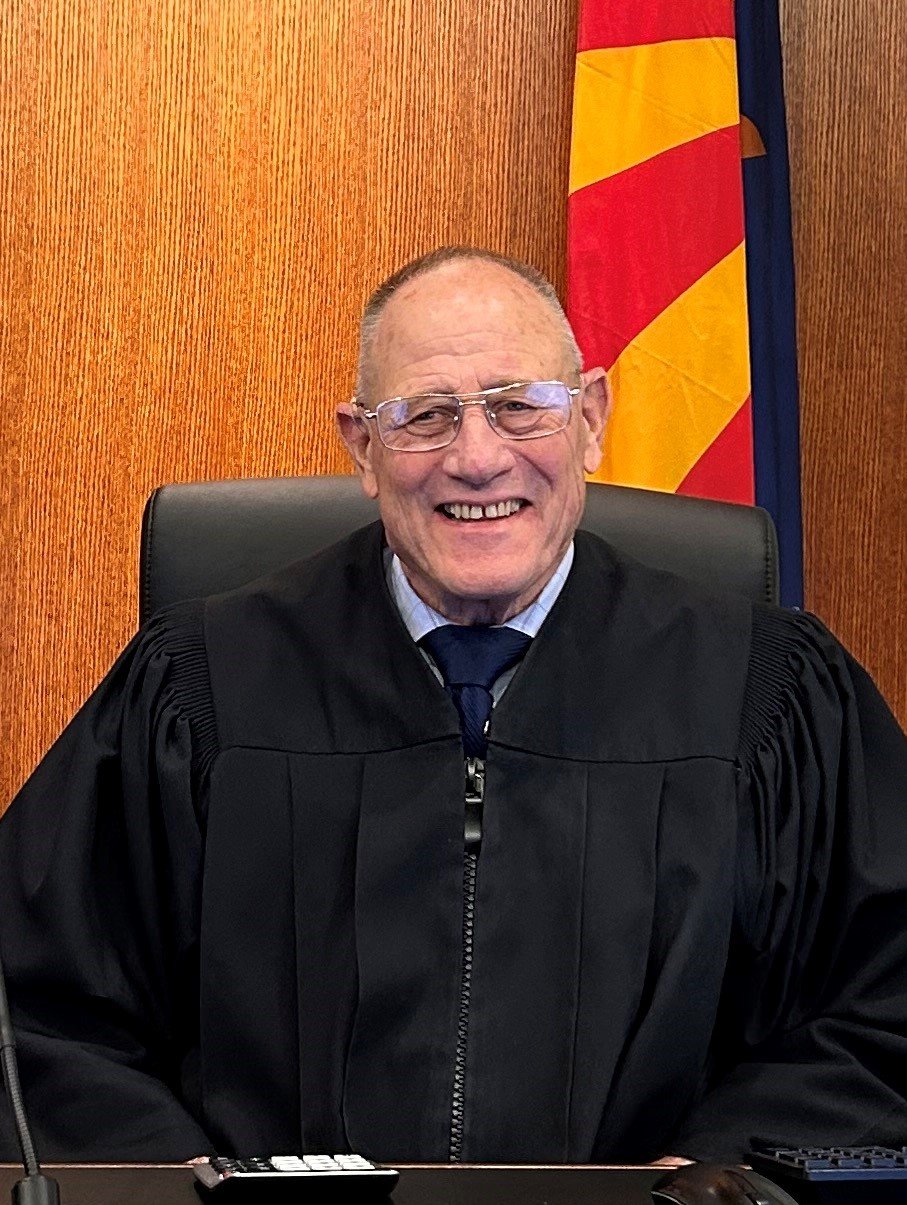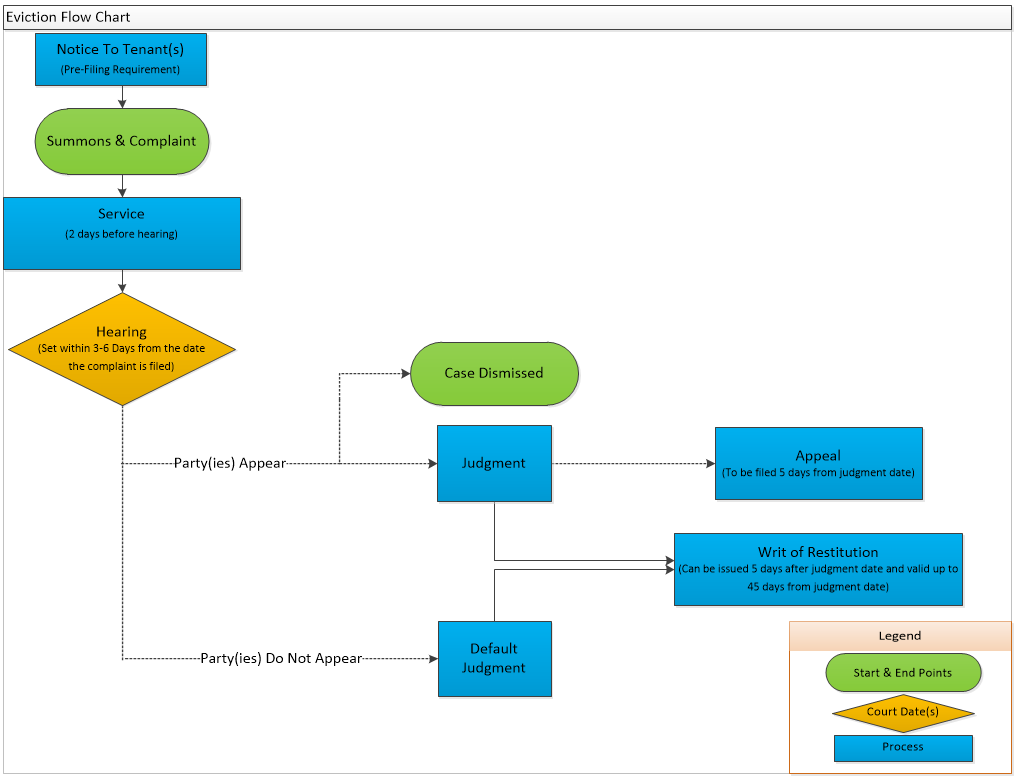
Hon. Ron Newman Evictions |
About the JudgeRon Newman presides over the Pima County Consolidated Justice Court‘s Evictions Specialty Court. He was appointed as a full-time judge pro tempore in 2021and presides over all eviction matters in Pima County Consolidated Justice Court. Eviction matters in Precinct 3 (Ajo) and Precinct 7 (Green Valley) are heard by those Justice Courts. Prior to his appointment, he served for 7 years as a part-time Judge Pro Tem for the Pima County Consolidated Justice Court. He is a license attorney who has practiced law for over 50 years, having routinely appeared in all State and Federal Courts in Arizona. |
- Introduction
-
The purpose of an eviction action is to remove the tenant(s) from the property. Prior to filing an eviction, the landlord must give notice to the tenant. The notice may be personally delivered or sent certified mail. Notice is deemed to be received on the date it was personally handed to the tenant or five days after the notice is mailed.
A landlord can file an eviction action against a tenant for nonpayment of rent, for breach of lease, for misrepresenting information to the landlord, for allowing unauthorized persons to live on the premises, or the tenant or the tenant's guests have committed a crime. - How to File
-
The Court provides the necessary forms with detailed information and instructions.
Click on the links below to view the forms:
JP12 Eviction Instruction to Plaintiff
JP06A Eviction Summons & Complaint
CVEA1 Answer (Eviction Action)
Filings may be subject to a fee according to the Civil Fee Schedule. If you cannot afford the fees you may apply for a Deferral or Waiver.
Other Services:
AZTurboCourt is an online service provided by the Arizona Supreme Court that will walk you through the process of completing the civil complaint form. There is a $15.00 fee for using this service. Once you have printed the forms you must file them with the Court. To begin using AZTurboCourt, click the link below.
- Case Flow Chart
-
- Common Case Terms & Definitions
-
Complaint - A formal allegation that initiates a lawsuit.
Creditor - One to whom a debt is owed.
Debtor - One who owes an obligation to another.
Default Judgment - A judgment entered against a defendant who has failed to plead or otherwise defend against a plaintiff's claim.
Defendant - A person being sued in a civil proceeding.
Garnishee - A third party who is served notice by a court to surrender money in settlement of a debt or claim.
Garnishment - A process that involves a court order to direct that money from a third party (employer or bank) be seized to satisfy a debt owed by a debtor to a plaintiff creditor.
Judgment - A formal decision made by a court.
Plaintiff - A party who brings a civil suit in a court of law.
Service - The formal delivery of a legal notice.
Summons - Provides legal notice to a party about a lawsuit and may involve an order to appear and or response to the complaint.
Writ of Restitution - Directs the constable to enforce the return of the property to the party entitled. - FAQ's
-
-
Is there a fee to file an eviction action?
- Yes, per the Civil Filing Fee Schedule a fee is required to file the complaint with the Court.
-
I was served with an Eviction Summons and I cannot appear at the set court date.
What can I do?
- The court date indicated on the summons is a mandatory court hearing. Failure to appear may result in a default judgment. If you cannot appear at the set court date you may file a motion.
-
What is a motion? What do I write on a motion?
- A motion is a formal written request to a judge for purposes of obtaining an order in favor of the individual making the request. You can download a motion form (CVRC7) available on our website at www.jp.pima.gov. Once you have downloaded the form and specified your request, you will need to mail the motion to the Court or bring it in person to 240 N. Stone Avenue Tucson, AZ 85701. A ruling will be mailed to you once the judge has reviewed the motion and made a decision.
-
Is there a fee to file a motion?
- Yes, per the Civil Filing Fee Schedule a fee is required to file a motion.
-
Do I need an attorney in an eviction action case?
- No, there is not a requirement to be represented by an attorney in an eviction case. Though an attorney is not a requirement, parties may be consult one regarding their case.
-
Is there a fee to file an eviction action?
- Appeal Process & Information
-
A party may appeal a final order or a final judgment entered in any civil case. The appeal procedure is set forth in Superior Court Rules of Appellate Procedure, and in the Arizona Revised Statutes.
To start an appeal, a Notice of Appeal must be filed with the trial court within five (5) calendar days from the date of the judgment. If a Notice of Appeal is not filed within 5 calendar days, the judgment can no longer be appealed.
There are two stages to appeal process. The first stage begins in the Justice Court; the second stage takes place in the Superior Court. All steps must be completed at both stages to avoid possible dismissal of the appeal.
The person who files the appeal is the Appellant. The opposing party is the Appellee. The Justice Court is the trial court.
To stay enforcement of the judgment a Notice of Appeal and a Supersedeas Bond must be filed with the court. There are two types of Supersedeas Bonds and they each have a separate purpose. The court cannot waive the Supersedeas Bond.- Stop collection: In order to stop collection of a monetary judgment, a Supersedeas Bond must be in an amount equal to the total judgment.
- Stop the eviction process: A Supersedeas Bond stays the eviction. As long as the defendant continues to pay monthly rent to the Court, the eviction cannot be enforced. The amount of the bond is the amount of rent due from the date of the judgment to the next periodic rental due date.
The court can issue a Writ of Restitution when rent payments are not received in a timely manner, which allows the landlord to resume the eviction process.
A Supersedeas Bond is not required to file an appeal. The appeal will proceed with or without a Supersedeas Bond.
***For a complete appeal packet and instructions please view form JP410 Appeal a Civil Judgment Packet***
- Rental Assistance
-
- Other Resources
-
- Landlord Tenant Act
- Landlord/Tenant Disputes: Eviction Actions
- State of Arizona Rental Eviction Prevention Assistance
- Rental Assistance and eviction prevention programs (Pima County)
- DES: Unemployment Insurance
- Available Online Eviction Forms
- Eviction Actions: Resources and Authorities
- Pima County Housing
- Community Investment Corporation
- Emergency Eviction Legal Services - Pima County
- Emergency Eviction Resources for Tenants
- Emergency Eviction Resources for Tenants (Spanish)
-
AZCourtHelp.org:
AZCourtHelp.org offers free assistance to all people who have legal information questions or need assistance in resolving disputes.
Click below for more information:

Eviction Information (English)
Eviction Information (Spanish)
- COVID-19 Emergency Eviction Procedures and Assistance
-
Due to concern for the spread of COVID-19 in the general population, the Governor of the State of Arizona declared a statewide public health emergency on March 11, 2020. Since March 2020, several federal executive, congressional, and federal court actions impacted tenant and landlord rights and the processing of eviction cases in Arizona's courts. In response to these federal actions, several administrative orders concerning the disposition of residential eviction actions have been issued in response to the COVID-19 public health threat that modified court operations to ensure justice in Arizona is administered safely and in accordance with applicable state and federal law. The most recent such order, Administrative Order No. 2021-129 (corrected), was issued on August 11, 2021, and provided alternate procedures applicable when a federal moratorium on evictions was in effect in a county and when it was not.
On January 19, 2022, Chief Justice Brutinel signed Administrative Order No. 2022-14 that outlines the procedures that are applicable to eviction actions governed by Arizona Revised Statutes, Title 33, filed on or before March 31, 2022, in the superior court or a justice court, and delayed by any eviction moratorium or seeking judgment for unpaid rent accrued during an eviction moratorium.
Unless unexpected circumstances prompt the issuance of another administrative order, eviction actions filed after March 31, 2022, are to be processed in accordance with the Rules of Procedure for Eviction Actions without additional supplementation.
Mortgage Forbearance: Through 09/30/21, there was a moratorium on evictions for nonpayment of rent for properties with federal mortgages when the landlord was receiving mortgage forbearance (deferred payment) for buildings with 5 or more units. The building mortgage must be backed by Fannie Mae or Freddie Mac (FHFA), the Federal Housing Administration (FHA), the U.S. Department of Agriculture (USDA), or the Veterans Administration (VA). To find out if a tenant is in a residence covered by this moratorium, go to Consumer Financial Protection Bureau's webpage and Federal Housing Finance Agency's webpage for tools and information about additional requirements for landlords.
FHFA Multifamily Tenant Protections - Minimum 30-day Notice to Tenant to Move Out: No landlord (public or private) whose underlying financing for a multifamily property is backed by the federal government (e.g., HUD/FHA or USDA), purchased or securitized by the Federal Home Loan Mortgage Corporation (Freddie Mac) or the Federal National Mortgage Association (Fannie Mae), or that is receiving assistance from the federal government may require a tenant to vacate their unit for nonpayment of rent until 30 days after the landlord has provided the tenant with a Notice to Vacate. Therefore, writs issued for those properties will be made enforceable after 30 days from the date the "5-Day Notice" is provided as required by state law.
HOW TO FIND OUT IF A MULTIFAMILY PROPERTY HAS AN ENTERPRISE-BACKED LOAN: Tenants may use Fannie Mae’s and Freddie Mac’s multifamily property lookup tools to determine if they live in a multifamily property with a mortgage loan purchased or securitized by that Enterprise. These lookup tools do not include other federally-backed properties.
Tenants living in multifamily properties with Enterprise-backed mortgages, who need support may contact the appropriate Enterprise:
- Fannie Mae’s Helpline: 877-542-9723
- Freddie Mac’s Helpline: 800-404-3097
Eviction Resources:


